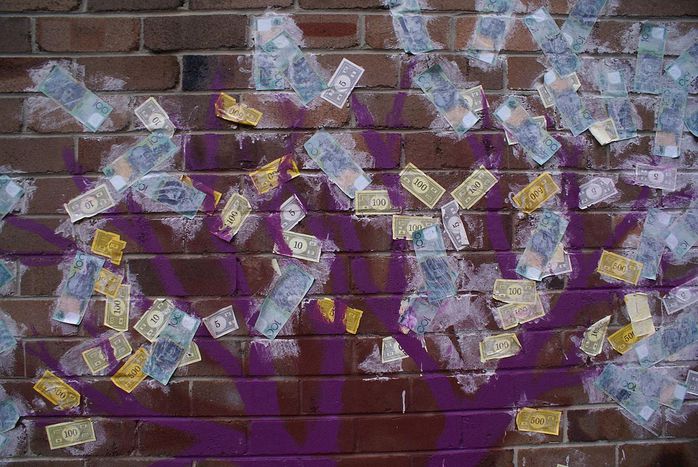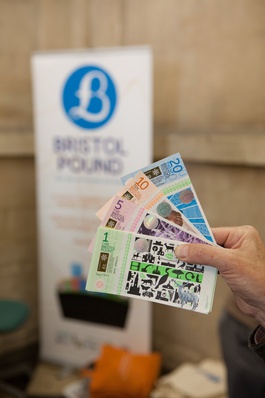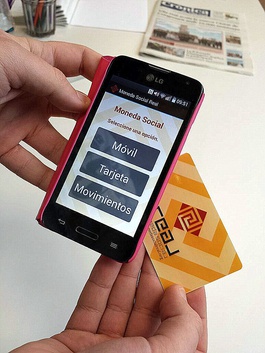
Complementary currencies: 'The other side to money'
Published on
Translation by:
Sam WellsNew forms of local economy are emerging in parallel to the traditional economic model. The search for economic alternatives is headed by complementary currencies; a model that tries to provide solutions to the problems of much of European society and that is gathering strength in leaps and bounds. Are the piggy bank's days numbered?
You have surely never considered leaving the house without your wallet. You'd be lost without it. You would have to ask a friend or colleague to lend you a quid for the coffee machine, and a couple more to get the bus or metro home. It's impossible to get rid of or replace money. We need it, but are we aware of the influence and power that it has on the future and sustainability of life on our planet?
Our social and ecological footprint is being badly affected and many people are demanding a solution. One reaction to this problem led to the creation of a "tool", which has experienced a major boom in recent years. They are the so-called complementary currencies, which cover a wide range of forms, on both a physical (virtual, digital, paper, etc.) and economic level. Each of them conforms to the different social realities of the countries where they are found. With these currencies, you can do everything from buying bread to going on holiday, depending on the currency and which shops or professionals accept it.
Local currencies
Complementary currencies, also known as local or alternative currencies, exist with the purpose of fuelling and encouraging both local work and spending and to empower communities to achieve social goals.
They exist in a wide variety of locations all over the world. In Europe, they are popping up all over the continent with a shared goal: to create a fairer and more personable economy. It is almost impossible to estimate how many social currencies there are, but we'll talk about two of them.
 Firstly, there's the Bristol Pound. It mightbe the most famous in Europe. It began over three years ago in the rebellious English city of Bristol. It has support and collaboration from the local Council, a local savings cooperative (Bristol Credit Union) and the involvement of at least 800 shops, as well as the backing of the vast majority of the local population. It has an attractive and colourful physical form, with £1, £5, £10 and £20 notes. Transactions can be made via the Internet, debit card or text message. The Bristol Pound can also be exchanged for regular sterling (at exactly the same rate) at many places on the high street.
Firstly, there's the Bristol Pound. It mightbe the most famous in Europe. It began over three years ago in the rebellious English city of Bristol. It has support and collaboration from the local Council, a local savings cooperative (Bristol Credit Union) and the involvement of at least 800 shops, as well as the backing of the vast majority of the local population. It has an attractive and colourful physical form, with £1, £5, £10 and £20 notes. Transactions can be made via the Internet, debit card or text message. The Bristol Pound can also be exchanged for regular sterling (at exactly the same rate) at many places on the high street.
Spain: Pioneer of complementary currencies
Spain has become one of the most prolific countries in Europe in terms of complementary currencies, boasting six: Puma, Demos, Ekhi, Zoquitos, Exproncedas and The Real. The last of these, the Real, is special in that it makes use of a lot of technology to be able to support customers and to pave the way towards a more equitable society whilst maintaining the objectives and values of all complementary currency.
The Real is a local electronic currency in Villareal, Castellón (Spain) and was created to boost local trade, encourage collaborative culture and support social initiatives. It isn't available in paper form - transactions are instead made by mobile or with a personalised card that employs NFC technology. NFC offers a fast and secure platform that allows payments via mobile phones. Since its inception, in 2004, until now, it has been used primarily for user identification, the collecting and exchanging of information and, in particular, mobile payments.
Wealth does not come from money
In short, it is time to start to question the traditional economic system that has enslaved so many and rewarded so few. It is possible to think up a more sustainable and caring system, although as long as politicians refuse to take that step forward, it is left to us to be the driving force that proposes solutions and alternative ideas such as complementary currencies.
Maybe everything will change the day we realise that wealth does not come from money, but our relationships with each other. Like everything else, complementary currencies have their defenders and their detractors, but for the time being, at least, it seems they have no intention of leaving.
Each complementary currency is different and unique. If you haven't seen them in your neighbourhood yet, they'll be there soon.
Translated from Monedas sociales: 'La otra cara del dinero’



